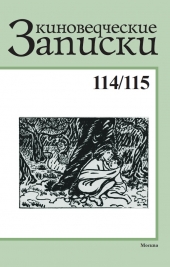 |
 |
SUMMARY FROM THE HISTORY OF FILM THOUGHT Michael WEDEL. Willy Haas is Dreaming of Eisenstein. On an Unknown Text Written in the Spring of 1924 Willy HAAS. Thinking in Images (Bildgedanke). Translated by N.Endelstein German critic Willy Haas’s (1891–1973) article Thinking in Images (Bildgedanke, 1924) is one of the world’s first reflections on young Soviet filmmakers in connection with the program of public enlightenment in the USSR in the 1920s. Michael Wedel sees this article as an anticipation of Eisenstein’s theory of intellectual cinema.
INTERLOCUTOR “I’ll Tell You About the Time And Myself.” Diary entries by Leonid Kozlov. Preparation of the text, foreword and comments by Elena Dolgopyat Eminent film scholar Leonid Kozlov’s (1933–2006) diary entries from the late 1950s reflect the characteristic meditations and quests of a young humanitarian in an era of historical changes.
WORKSHOP Peter BAGROV. KEM, A Workshop That Was Not Fridrikh ERMLER. How We Started. Publication by Adia Bonitenko and Lar- isa Georgievskaia, comments by Peter Bagrov Children of the Storm. Publication by Evgenii Margolit KEM (Film Experimental Workshop), at the origin of which was Fridrikh Ermler, is regularly mentioned among artistic collectives of the early 1920s, but little was known about it. Peter Bagrov’s article fills this substantial gap in the history of Soviet cinema. The article is supplemented by a transcript of Ermler’s own memoir, as well as by a selection of press reviews and production stills for Ermler’s and Eduard Ioganson’s lost film Children of the Storm (1926), their first feature‑length work. The tipped‑in illustrations contain frame enlargements, made from the original tinted and toned film clips, which were stored in the family of the actor Valerii Solovtsov.
SATYAJIT RAY—100 Satyajit Ray About Himself and His Work. (From Interviews Published in Vari- ous Magazines in 1965–1981). Translated by Vera Rumyantseva Conversation between Satyajit Ray and Shyam Benegal. Translated by Naum Kleiman Davlat KHUDONAZAROV. Down Satyajit Ray’s Road Fragments of memoirs and an interview, as well as an essay by Davlat Khudonazarov about his impressions of the work and personality of the great Indian director, are published here to commemorate the centenary of the classic of world cinema Satyajit Ray (1921–1992).
EXPERIENCE Jonathan BAR GIORA. A Sound Statement. Translation by Naum Kleiman Irina MARGOLINA. The Right to Freedom: Color in the Era of ‘Malo- kartin’e’ Artiom SOPIN. 1951: Unfinished Films (The research was funded by RFBR according to the project № 21-012-43026) Composer Jonathan Bar Gior takes a fresh look at the film Romance Sentimentale (1930) by Sergei Eisenstein and Grigori Aleksandrov, placing it in the context of their and Vsevolod Pudovkin’s famous theoretical Statement about the possibilities of sound cinema and emphasizing satirical parody in image and sound. Articles by Irina Margolina and Artiom Sopin are devoted to the period of malokartin’e (cine‑anemia) in Soviet cinema: the former examines the mastering of color, the latter sheds new light on the twists and turns of the ideological policies in the last years of Stalin’s rule.
TOWARDS AN INTERPRETATION OF A FILM Oleg ZASLAVSKY. Leitmotifs of American Soldier Based on the key motives in narrative, direction, and music in Rainer Werner Fassbinder’s American Soldier (1970), this article analyzes the semantic structure of the film.
EXPLORATIONS Anna KOVALOVA, Arina RANNEVA. Symbolism in Early Russian Cinema and the Ghostwriter Aleksandr Kursinskii Brigitte FLICKINGER. Between Intimate and Public. Cinema in Metropoli- tan Areas: London, Berlin and St. Petersburg Until 1930. Translated by Anasta- sia Balykova, Oksana Maistat Oksana MAISTAT. Kinolandia: (Imaginary) America in Leo Mur’s Texts of the 1920s and 1930s Anna Kovalova and Arina Ranneva article about the screenwriter Aleksandr Kursinskii (1873–1940) and Oksana Maistat’s paper on film critic and director Leo Mur (1889–1938) restore the peculiar role of forgotten or overshadowed filmmakers in the history of our cinema. Brigitte Flickinger’s essay is dedicated to the image of film theaters in the cultural space of three European capitals and in the urban mythology in general.
PERSONALIA Valerii AKIMOV. The Origins of Poetic Creativity. Jean Cocteau’s Film Trilogy Philosophical and analytical essay is devoted to the imagery of Jean Cocteau’s classic film trilogy: The Blood of a Poet (1930), Orpheus (1949), Testament of Orpheus (1960).
EXPERIENCE. PARALLELS Bernard EISENSCHITZ. Love One Another / Die Gezeichneten. Translated by Vera Rumyantseva Yulia SMIRNOVA. A Realistic Trend in the Films of Transcendental Style. The Problem of Contamination of Ocular and Discrete Types of Framing (The Passion of Joan of Arc by Carl Th.Dreyer and The Trial of Joan of Arc by Rob- ert Bresson) In his study, Bernard Eisenschitz examines the links between Carl Th.Dreyer’s film Love One Another (1922) and its literary source, Aage Madelung’s novel Elsker hverandre (Love One Another), and reveals the interaction of several cultures in the film version: Danish, German, Jewish, and Russian. Yulia Smirnova’s article compares directorial stylistic strategies in Carl Th.Dreyer’s and Robert Bresson’s films about Joan of Arc.
CINEMA: LIFE AND ADVENTURES Olga KRUCHININA. From Memoires. Foreword, publication, and comments by Dina Kharkova Sergei LINKOV. Happy times Dina Kharkova transcribed and commented a magnetic tape with memoirs of the famous costume designer Olga Kruchinina (1917–2007) who worked on such challenging films as The Stone Flower (1946), The Great Warrior of Albania Skanderbeg (1953), Scarlet Sails (1961), Lenin in Poland (1965), Red Bells (1982). Sergei Linkov’s memoir sketch recreates the image of Mikhail Romm, with whom the author worked in the last years of the director’s life.
FILMOGRAPHY Peter BAGROV, Evgenii MARGOLIT. Soviet fiction short films and film collections of 1941–1943. This filmography, based on a variety of published and archival sources, combines scattered information about short films that play an important role in the history of Soviet cinema during the first years of WWII. |
|
 |
||||||||||||||||||||||||||||||||||||||||||||||||||||||||||||||||||||||||||||||||||||||||||||||||||||||||||||||||||||||||||||||||||
| « | » |
является незаконным.



